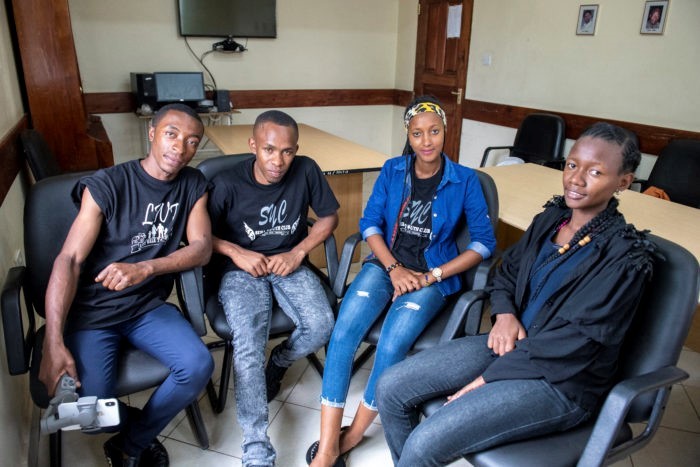Speeches Shim

Youth are a significant part of the population affected by HIV/AIDS in Tanzania’s Arusha region. Fortunately, some youth have found comfort in teen clubs set up by USAID’s Boresha Afya (Improve Health) activity. These clubs consist of support groups for children aged 10-19 who are living with HIV, and are designed to help HIV-positive adolescents support each other. The clubs address the psychological and clinical needs of adolescents so that they feel confident, stay on treatment, and prevent transmission of the virus to their own future partners or children.
One of the teen club beneficiaries in Tanzania’s Arusha City is Jane (21). Jane has been an active member of the club since her teenage years and is still a supporter. While visiting the teen club at St. Elizabeth Hospital, the lively young woman eagerly shares her story.
It all started when I was a baby. My mother made sure I took a pill every day and told me that the pills were for my headache. As I was young and naïve, I faithfully took the pills without any questions. After completing my primary school education I joined a boarding secondary school. My mum instructed the teachers at the school to continue giving me the pills every day.
One day, during my biology class in one of the books I was reading, I saw a pill that looked exactly like the one I was taking. I was astonished to learn that the pills were for HIV/AIDS treatment. I went on to google the name of the drug and the results confirmed my suspicions. It didn’t take much effort to fill the gaps and realize I was living with HIV. At that moment, it felt like the world had stopped for me. What I felt was unimaginable. I confronted my mother but she still was not ready to tell me the truth at that time. I remember seeing tears roll down her cheeks. After some time, she gathered courage and told me the truth. She told me I am HIV positive but she also gave me hope. She told me this was not the end of my life and assured me that I could still pursue my life’s dreams. Despite the assurance, life was never the same for me.
Things took a different turn when, a few months later, I was introduced to the Ariel teen clubs at St. Elizabeth Hospital in Arusha. I met fellow peers who were also HIV positive like me. Unlike me, they oozed with positive energy and hope. I slowly began to accept who I am and refused to allow to be defined by my HIV status. Not only have we found hope at the teen club, but we also engage in entrepreneurship activities such as printing and selling t-shirts.
Through the teen club, Jane and other teenagers reach out to other young HIV positive youths to ensure they take their antiretrovirals and suppress HIV.
One of the inspirational highlights of Jane’s transformation is a training she attended where she mingled with HIV positive peers from other countries such as Kenya, Uganda and Rwanda.
”I learned my peers were engaging with their leaders and influencing positive changes in their communities,” she says. When Jane returned from the training, she visited her village elder and asked for support to start a group for young people living with HIV. The village elder supported her and while she endured a lot of stigma, over time, her efforts helped to reduce the stigma associated with HIV.
Jane faced many trials and tribulations to not be defined by her HIV status. “I remember in secondary school a teacher announced publicly to fellow students that I was HIV positive on learning about my status”, Jane recalls.
“My life turned hellish. I was discriminated against in the dormitory and everywhere. It is the words from my mum that told me to be strong. She helped me turn my misfortune into a fortune – to stand for myself and educate others. Instead of discriminating against me while not knowing their status, my peers too can seek to know their status and lead healthy lives”, Jane says.
“I am so proud of the model Jane has become”, Joyce Michael, Jane’s mother says with a sense of delight.“She is a great role model to others and an anti-stigma champion”.
Results from a Boresha Afya evaluation study reveal that young people attending support clubs are three times more likely to remain on treatment compared to those who were not attending such clubs. Jane is just one of 780 adolescents from the 15 teen clubs in Arusha benefiting from the USAID Boresha Afya activity.
“The peer support they get from the clubs encourages them to attend their next visit where they socialize and share experiences with other peers”, Theopista Massenge, a Senior Advisor for Pediatric and Adolescents for Boresha Afya says.

Comment
Make a general inquiry or suggest an improvement.